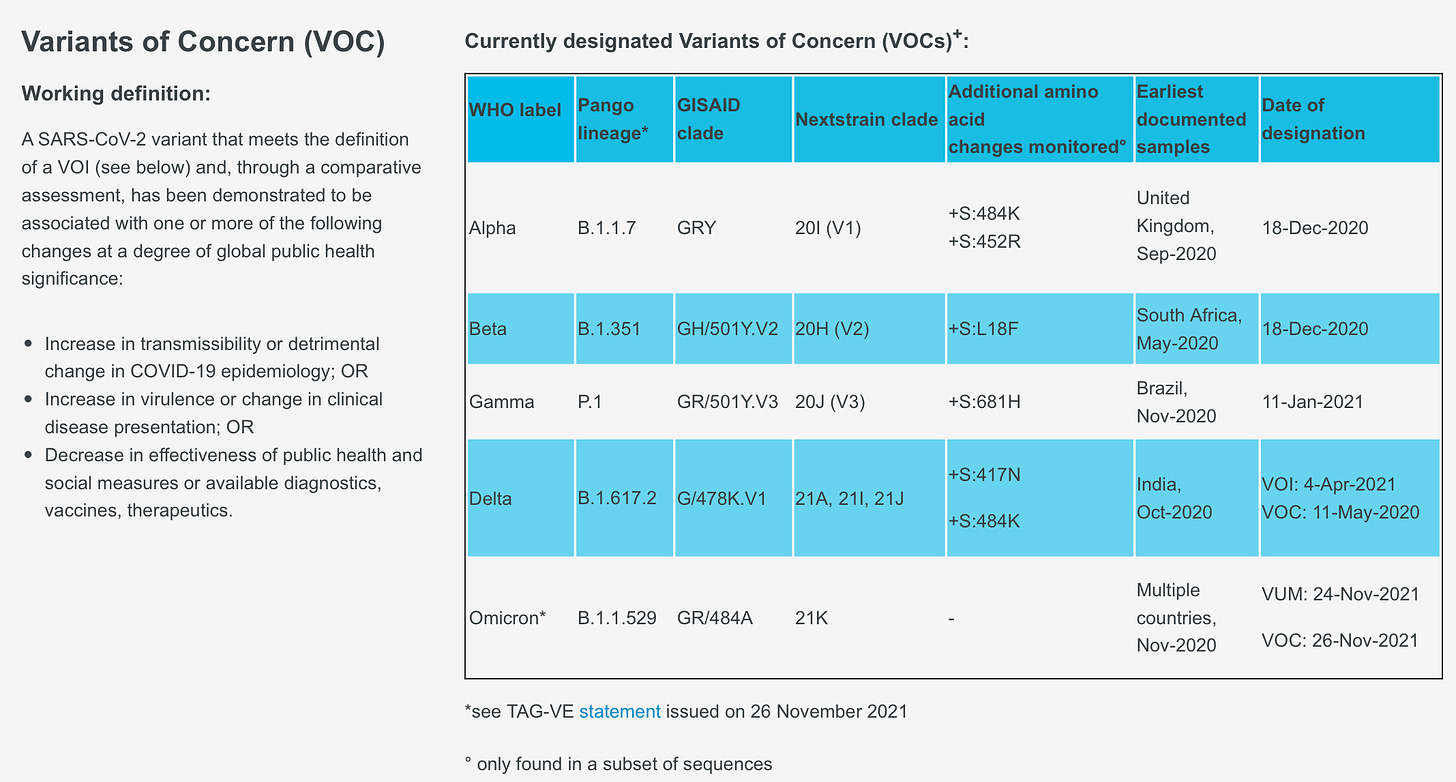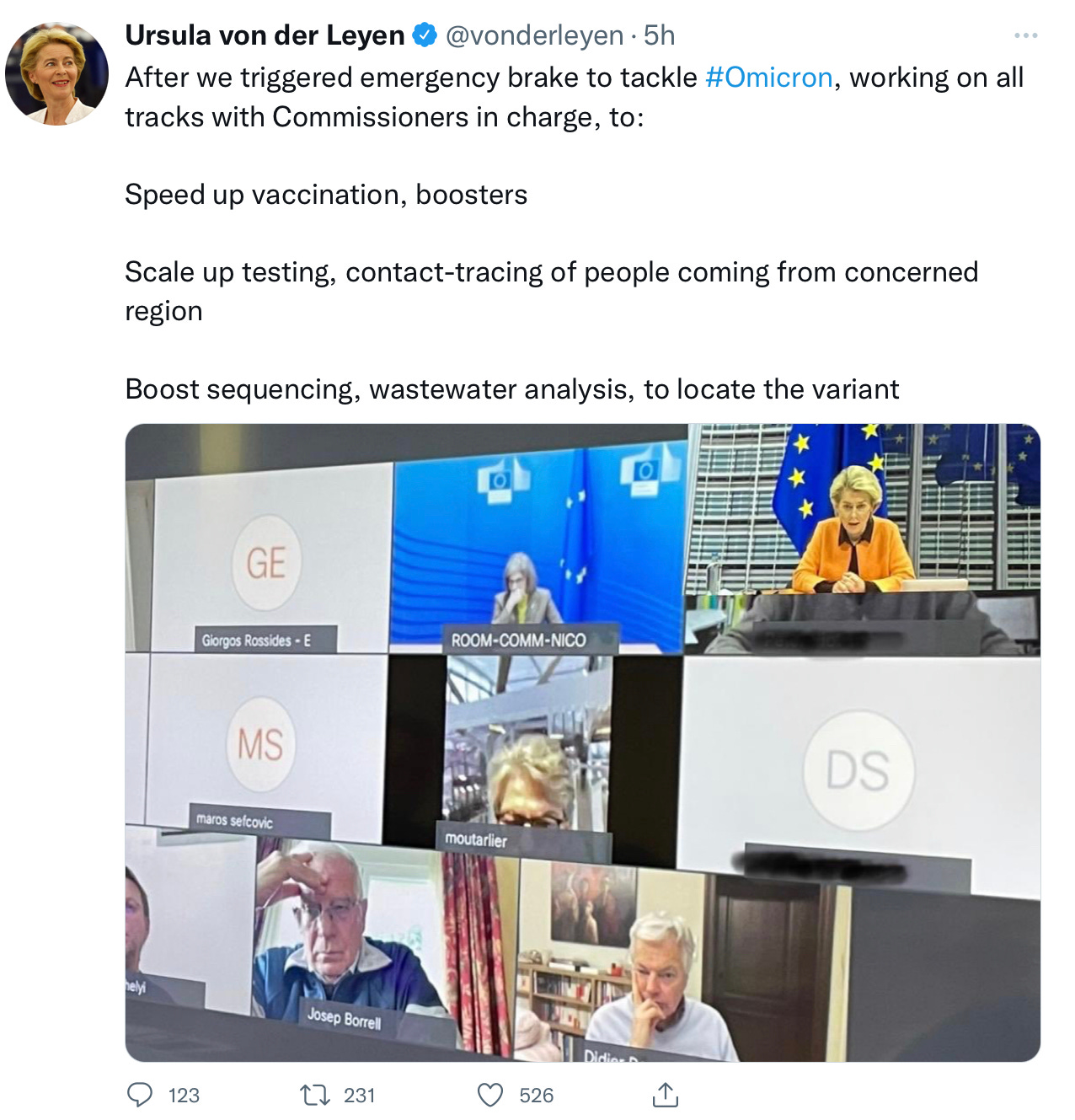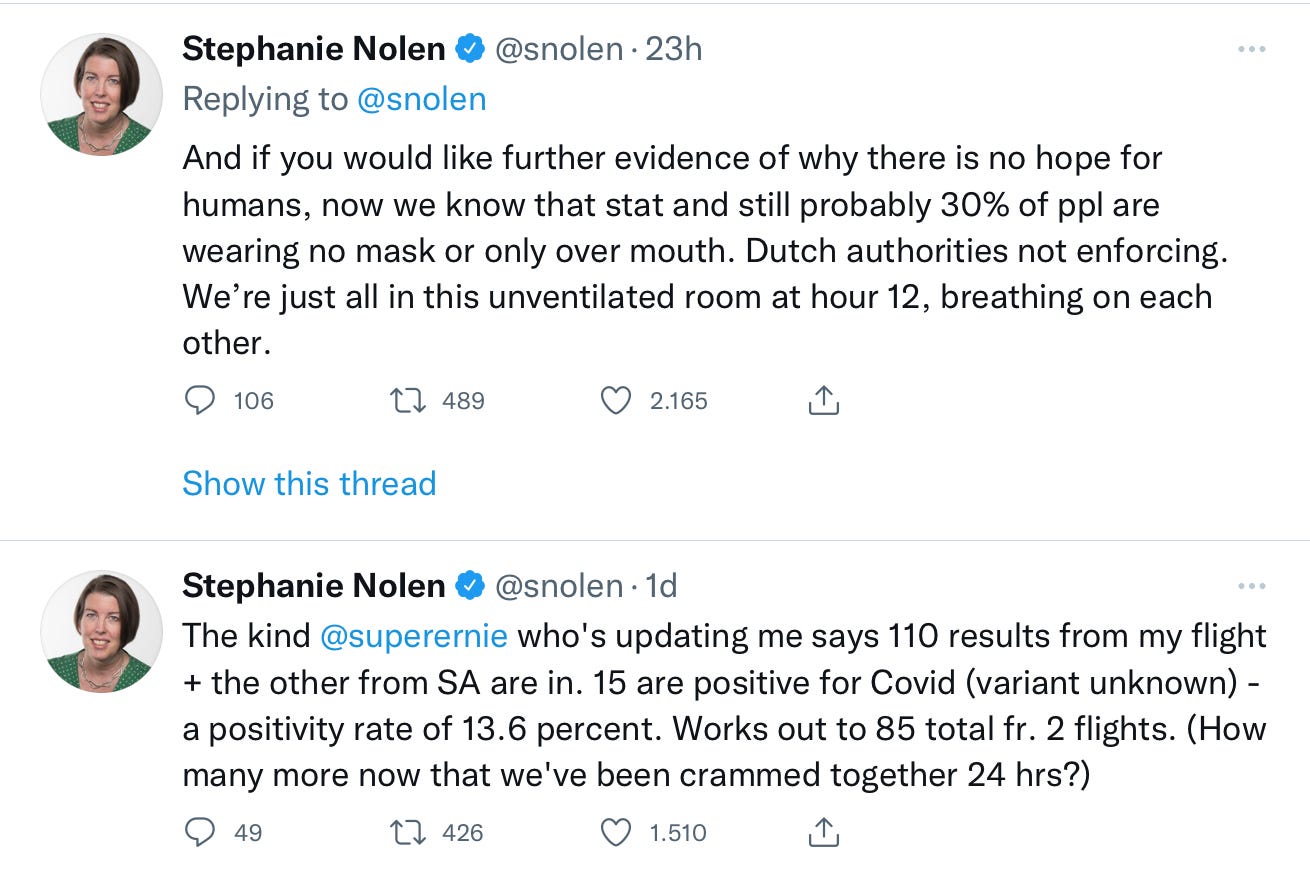Concerning new variant traveling fast
Suspected cases reported in countries across Europe including Denmark
The World Health Organization has put the new COVID B.1.1.529 variant on its most serious list called ‘Variants of Concern’. The WHO has also designated it as the ‘Omicron’ variant. The global health agency says evidence so far indicates this variant has a “growth advantage” even over the Delta variant. That said, it is early days and what we know about the Omicron variant is going to be fluid for a while as more data comes pouring in.
🇪🇺
The European Centre for Disease Prevention and Control has also added the Omicron variant to its ‘variants of concern’ list. The agency’s threat assessment of the new mutation calls it the most divergent variant yet “which raises concerns that it may be associated with increased transmissibility, significant reduction in vaccine effectiveness and increased risk for reinfections.” It assesses the risk of community spread of this new variant as ‘High’ in the EU in general but adds in countries where the Delta variant is resurgent, the risk of the Omicron strain arriving and spreading is ‘Very High.’
While travel restrictions began to fall like rain on South Africa and a number of countries it borders from Friday and on it looks like they have come too late. Since Saturday, confirmed or suspected Omicron cases have been reported in Hong Kong, Israel, Belgium, Germany, Italy, the Netherlands, Czech Republic, Austria, England, and Denmark
🇩🇰
Late Saturday night, Denmark’s Ministry of Health sent out a press release saying that two people have tested positive with a variant strain with “mutations that are characteristic of Omicron, and are thus most likely Omicron.” A full confirmation is pending on the results of whole genome sequencing of the two positive test results, which will probably come in the next few days.
Health Minister Magnus Heunicke:
“Health authorities have reasonable suspicion that we have the first two cases of the new variant Omicron in Denmark. We are one of the countries with the most comprehensive monitoring of variants, and therefore it is not surprising that we find cases in Denmark at an early stage. The people who have been infected have been in South Africa and are now in isolation, and the authorities are in the process of tracing the third link - that is, close contacts and their close contacts, who are all encouraged to go into isolation and of course to get tested. And the authorities are working hard to find everyone who was on the same plane as the two infected people.”
It looks like the two infected people traveled into Denmark on separate days and on two different flights. The Danish Agency for Patient Safety is asking anyone who was on board flight KL1129, flying from Amsterdam to Copenhagen on November 23, and flight KL1345, flying from Amsterdam to Billund on November 24, to quarantine immediately and get a PCR test ASAP. The agency says even if the first test is negative, they should remain in isolation and get a 2nd PCR test two days later. They can come out of quarantine only if the second test result is also negative.
The agency is also asking anyone in Denmark who has been to South Africa, Lesotho, Eswatini, Mozambique, Zimbabwe, Botswana, and Namibia in the last ten days to go into isolation and get tested ASAP regardless of vaccination status. They should also get tested again on day 4 and day 6 and only come out of isolation if all tests are negative. If more than six days have passed since entry into Denmark, then the Agency for Patient Safety says one negative test result will do.
Danish Agency for Patient Safety Deputy Director Birgitte Drewes:
“We now have the first suspected cases of the new virus variant Omicron in Denmark, and therefore, we recommend, based on a precautionary principle, a test for everyone who has arrived in Denmark recently after a stay in South Africa or the six neighboring countries. With two suspected cases of the Omicron variant in Denmark, we have initiated intensified infection detection. The intensified infection detection will also apply to all infected people from the countries in question where we do not yet know the variant.”
Anyone who has been in the South African region since November 16 who has concerns or questions can call the Danish Agency for Patient Safety at 32 32 05 11.
In this situation the rules for close contacts and their close contacts tighten considerably. In both cases, if someone is a close contact or the close contact of a close contact of anyone with any likelihood of having the Omicron variant, then they must go into quarantine. For both sets of contacts they must also get PCR tests on day 1, then again on days 4 and 6. Quarantine ends only with negative test results across the board.
On Friday, Denmark announced travel restrictions that came into force at midnight Saturday. This turned out to be two hours after the Danish health ministry revealed two suspected cases of the variant.
As of Saturday at midnight South Africa, Lesotho, Swaziland, Mozambique, Zimbabwe, Botswana, and Namibia were all declared COVID red zones. This triggers a number of travel restrictions. All travelers from the seven South African nations who are not Danish citizens or permanent residents must now have a ‘recognizable purpose’ to visit Denmark and have a negative PCR test before boarding a flight. As well, all travel from Denmark to any of the seven countries, including business travel, is discouraged.
🇩🇪
In Germany there are three suspected Omicron infections one in the German state of Hessen and two others in Bavaria. In all three cases health authorities in the two German states said they were travelers from the South African region. The two suspected infections in Bavaria flew into Munich on Friday the day before the global variant alarm was sounded. In the case of the infection in the state of Hessen it was a fully vaccinated woman who flew back into Germany a week ago. She began to develop COVID symptoms and got tested with the test results setting off alarm bells.
The suspected cases come even as Germany has banned all incoming travelers from South Africa unless they are German citizens or permanent residents. Even then, everyone arriving from the region must quarantine for a full 14 days regardless of vaccination status.
German Health Minister Jens Spahn’s worst fears seem to have been realized as the suspected cases were announced a day after this quote announcing travel restrictions.
“The newly discovered variant is worrying, so we act proactively and early. The last thing we need right now is a new more problematic variant.”
🇧🇪
Perhaps one of the most concerning suspected Omicron infections is one of two cases in Belgium. A young woman who was unvaccinated flew from Egypt to Belgium via Turkey only to test positive 11 days after arriving. She has no travel history or any other links to South Africa, which raises a pretty good possibility the variant has already been spreading outside of that region.
🇮🇹
On Saturday Italy banned entry to any incoming traveler who has been to South Africa, Lesotho, Botswana, Zimbabwe, Mozambique, Namibia, or Swaziland in the last two weeks due to fears of the new Omicron variant. It didn’t do them much good as later that same day the country confirmed its first Omicron infection.
🇪🇺
The EU and its member nations have agreed to pull the ‘emergency brake’ on travel from South Africa and six of its neighbouring countries. This means a ban on all travel into the European Union from all seven African nations. The move to impose the ban came as flights were in the air leading to some major delays as flights were essentially quarantined on the tarmac as they arrived.
One of the flights arriving in Amsterdam that was impacted happened to have NY Times health reporter Stephanie Nolen onboard. Her thread of tweets describing the ordeal can be found HERE.
The Financial Times is reporting that of the 600 people who flew into the Netherlands from South Africa on Friday, some 61 have tested positive for COVID. Obviously, at this stage we don’t know yet if any of them were the Omicron variant.
🇬🇧
In the United Kingdom Health Minister tweeted that they have two suspected cases of the Omicron variant as well.
“As a precaution we are rolling out additional targeted testing in the affected areas, Nottingham and Chelmsford, and sequencing all positive cases.”
The UK is taking the situation fairly seriously. Within hours of announcing two suspected cases of the concerning Omicron variant restrictions were tightened. Face masks were made mandatory on all public transit and in all retail shops. Close contacts rules were tightened so that anyone suspected of being a close contact of someone with an Omicron COVID infection must isolate for ten days regardless of their vaccination status. All international arrivals in the UK must also now be quarantined pending a negative test result on the second day of isolation.
The UK also announced it is adding Malawi, Mozambique, Zambia, and Angola to the travel red list effective from 4am on Sunday. Any travelers who have arrived in the United Kingdom from those countries in the last 10 days must immediately quarantine and get PCR tests.
🇮🇱
Israel has four confirmed cases of the Omicron variant, including three with no travel history, and seven other suspected cases. As a result, the Israeli government has elected to ban all foreign travelers for at least the next two weeks due to variant fears.
According to the Jerusalem Post, all returning travelers to Israel, regardless of vaccination status, must isolate for three days on arrival. Travelers will be tested on arrival a s again on day three of isolation. Two negative tests will end the quarantine.
🇭🇰
There are a handful of suspected Omicron infections in Hong Kong, with the initial case being someone who traveled from South Africa. The additional cases appear to be people who were in the same hotel as the infected person. One of those is a Canadian who traveled to Hong Kong from Vancouver and appears to have been infected after his arrival.







